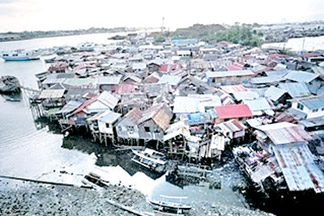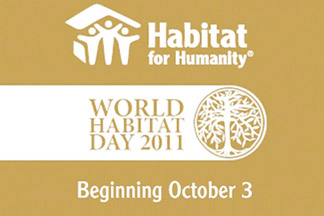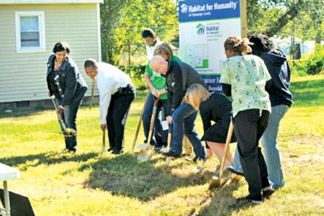|
Fukuoka International symposium highlights:
Climate change , a major challenge of 21st century
by Anuradha KODAGODA
The United Nations has chosen the first Monday of October every year
as the World Habitat Day. This year, the World habitat Day was
celebrated on October 3
|

Toshi Noda |
and the global celebration was hosted by the
Government of Mexico at the same time many countries around the world
also celebrated the day by organising several events.
The Habitat Day was established in 1978 with a mission to promote
socially and environmentally sustainable towns and cities with the goal
of providing adequate shelter for all which is mandated by the UN
General Assembly.

From 2002, the Agency's mandate was strengthened and its status
elevated to that of a program of the UN system in a UN General Assembly
resolution.
Key recommendations and modifications of the agenda are now under way
as strategy clusters for achieving the urban development and shelter
goals and targets of the Millennium declaration, the United Nations'
development agenda for the next 15 to 20 years.
Through this the UN-HABITAT contributes to the overall objective of
the United National system to reduce and promote sustainable development
along with support from relevant governments, local authorities,
non-governmental organizations and civil societies.
 "The United Nations chose the theme "cities and Climate change"
because climate change is fast becoming the prominent development
challenge of the 21st century. "The United Nations chose the theme "cities and Climate change"
because climate change is fast becoming the prominent development
challenge of the 21st century.
This year, World Habitat Day falls during the month when demographers
predict our planet's seven billionth inhabitant will be born.
The future that this child and its generation will inherit depends to
a greater degree on how we handle the competing pressures of growing
population growth, urbanization and climate change," speaking at the
Fukuoka International Symposium on "Cities and Climate Change", which
was held on October 3, Director, United Nations Human Settlements
program Asia and the Pacific, Toshi Noda streesed.
"Experts predict that by the year 2050, global population will have
increased by 50 percent from what it was in 1999. also by that time,
scientists say, global Green House gas emissions must decrease by 50
percent compared to levels at the turn of the millennium.
I call this the '50-50-50 challenge," he further said.
Rising sea levels are a major impact on climate change which is an
urgent concern. More than sixty million people now live within one metre
of sea level. By the end of the century, that number will increase to
130 million. Main cities such as Cairo, New York, Karachi, Calcutta, New
Orleans, Shanghai, Tokyo, Lagos, Miami and Amsterdam could face serious
threats from storm surges. Cities are centers of industrialisation and
sources of emissions but they are also home to solutions. More and more
municipalities are harnessing wind, solar and geothermal energy,
contributing to green growth and improving environmental protection.
Speaking at the Fukuoka International Symposium on "Cities and
Climate Change", Senior Human Settlements Officer UN_HABITAT for Asia
and the Pacific, Lalith Lankatilleke pointed out the main challenges
which they confront when creating disaster resilient cities, such as,
majority of housing in developing countries of the Asia-Pacific region
which are produced by the people themselves and of these 25 to 65
percent are in informal settlements in cities.

He also stressed the other factors which are affecting vulnerability
as, smaller families in the cities, single parent families which very
often headed by females and both parents have to work for long hours to
earn sufficient amount of money which only can satisfy their day-to-day
living expenses.
Over the last two decades the severity and scale of disasters have
been unpredicted and people not experienced such disasters and
therefore, they are not prepared. However, these disasters exacerbated
poverty due to loss of housing and loss of earning opportunities."
Considering all these factors Lalith Lankatilleke stressed the
importance of brining people into the centre of the process by involving
them in the level of decision-making, action and also the importance of
making people responsible for creating disaster resilient cities by
their own.
"The key message that is conveyed here is that the people are central
to building disaster resilience and they need to be supported by civil
society, local governments and national institutions," he further said. |

